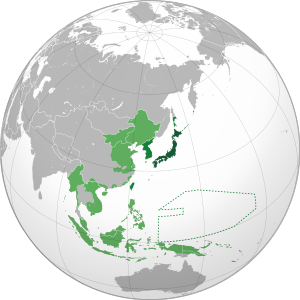This article's lead section may be too long. (September 2023) |
The history of Japanese foreign relations deals with the international relations in terms of diplomacy, economics and political affairs from about 1850 to 2000. The kingdom was virtually isolated before the 1850s, with limited contacts through Dutch traders. The Meiji Restoration was a political revolution that installed a new leadership that was eager to borrow Western technology and organization. The government in Tokyo carefully monitored and controlled outside interactions. Japanese delegations to Europe brought back European standards which were widely imposed across the government and the economy. Trade flourished, as Japan rapidly industrialized.
European-style imperialism and colonialism were borrowed, as in the late 19th century Japan defeated China, and acquired numerous colonies, including Formosa and Okinawa. The rapid advances in Japanese military prowess stunned the world in 1904–1905 when it decisively defeated Russia and gained recognition as a world power. Imperialism continued as it took control of Korea, and began moving into Manchuria. Its only military alliance was with Great Britain. During 1902–1923. In the First World War, it joined the Allies, and seized many German possessions in the Pacific and in China. Japan put heavy pressure on China, but China resisted.
Although the political system was formally democratic, the Army increasingly seized control in Japan. Indeed, in the 1930s, separatist Army elements in Manchuria largely shaped foreign-policy. The League of Nations criticized Japan's takeover of Manchuria in 1931, so it withdrew. It joined the Axis alliance with Germany, but there was little close cooperation between the two nations until 1943. Japan opened a full-scale war in China, in 1937, taking control of the major cities and economic centers with a long record of atrocities. Two puppet regimes were nominally in charge in China and Manchuria. Military confrontations with the Soviet Union were disappointing to Japan, and it turned its attention to the south. American economic and financial pressures, joined by Britain and the Netherlands, climaxed in the cut off of vitally needed oil supplies in 1941. Japan declared war, and in three months scored spectacular successes against the United States, Britain and the Netherlands, as well as continuing the war with China. The Japanese economy could not support the large-scale war effort, especially with the rapid buildup of the American navy. By 1944, Japan was heavily on the defensive, as its Greater East Asia Co-prosperity Sphere collapsed, its navy was sunk, and American bombing started to devastate major Japanese cities. The final blow came in August 1945 with two American atomic bombs and the Russian invasion. Japan surrendered, and was occupied by the Allies, or more particularly by the United States. Its political and economic system was rebuilt on the basis of greater democracy, no military capability, and a weakening of traditional monopolistic corporations.
Japan was a very minor player in international affairs in the late 1940s, but its economy revived in part as a supply base for the Korean War. Non-involvement became the central focus of Japanese foreign policy, together with very rapid growth of its industrial exports. By the 1990s, Japan, with the second-largest economy in the world behind the United States, reached a peak and leveled off economically. It retained very close relations with the United States, which basically provided it with military protection. South Korea, China, and other countries in the Western Pacific traded on a very large scale with Japan, but still deeply resented the wartime atrocities.
After the United States, China and Japan have the two largest economies in the 21st century world. In 2008, China-Japan trade reached $266 billion, making them the top trading partners. However, historical issues, including the Japanese war and maritime disputes, have created tensions. Despite this, leaders from both countries have made efforts to improve their relations. In 2021, Japan hosted the Summer Olympics. It won 27 gold medals and ranked third overall. When in 2022 Russia invaded Ukraine, Japan condemned it and implemented sanctions, including freezing assets and banning new investments and exports of high-tech goods. The conflict in Ukraine, along with threats from China and North Korea, led to a shift in Japan's security policy. Japan increased defense spending and announced a major shift in military policy, acquiring counterstrike capabilities and aiming to increase the defense budget to 2% of GDP by 2027. This change in policy could make Japan the world's third-largest defense spender, behind the U.S. and China.
- See also Military history of Japan

© MMXXIII Rich X Search. We shall prevail. All rights reserved. Rich X Search
